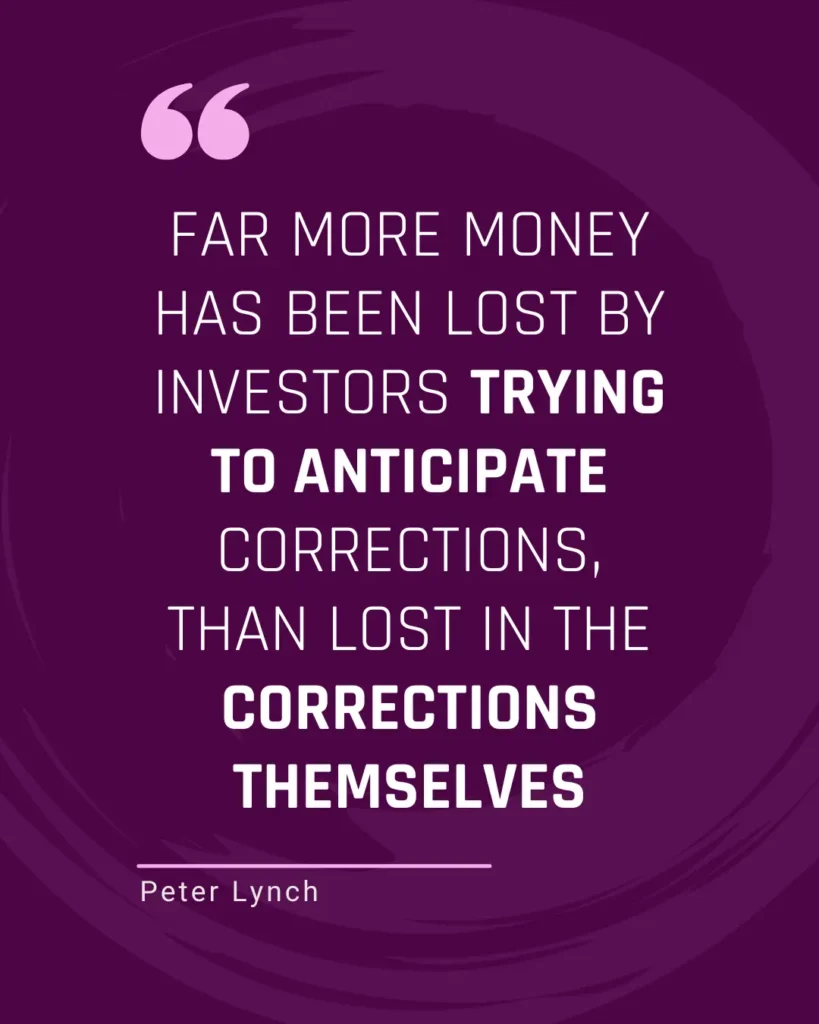Lately, a few private investors I’ve been chatting with keep asking me the same thing: “Should I sell stocks from my portfolio since my stocks are dropping in value?” It’s a fair concern, especially during market downturns. While I’ll share my perspective in this post, the short answer is: don’t sell just because they’re dropping.
Don’t sell stocks just because they’re falling in value
Sell stocks just because the prices are dropping might be the worst thing you can do.
This might give you a moment to think, but I really believe it’s true. Just last week the stock markets had a really bad day, and it got me thinking about how often people make fear-driven decisions in the stock market.
Buying and selling stocks is a tricky business, and it’s no wonder many people are intimidated by it. What if you buy at the wrong price? What if you sell at the wrong time? Suddenly, out of nowhere, the value of your shares could plummet. In a flash, 50% of your value can vanish. It happened before.
It’s totally normal to freak out sometimes, but jumping to conclusions and trying to guess the market can really backfire and cost you. Let’s see why these reactions can hurt your portfolio and what you can do instead.
Timing the market
I think you know, but as a reminder: timing the market is a fool’s errand.
You can never predict what’s going to happen. And if, by some rare chance, you think you can predict what the market is going to do, you’re probably not allowed to trade based on that knowledge. This is called insider trading, and it’s illegal. You could even go to jail.
If you work for a publicly traded company and know the annual results are going to be a disaster, you can’t just sell off all your shares. You’ve got a duty of confidentiality to uphold.
While some analysts occasionally make correct predictions about downturns, no one can consistently do this. Take Black Monday, for example. Almost no one predicted it, and the same goes for the 2008 financial crisis. It is clear that no one predicted both correctly 😀
In short, timing the market is not a profitable strategy. Most likely it’s a losing strategy that will hurt your wealth. Way more important is time in the market.

The Real Value of Your Shares
“You only know the value of your shares when you sell them.” Sure, it’s a cliché, but most clichés include some truth. Let us break it down.
Assume you buy a stock today for $100. Over the next three years, its market price will rise to $200. 100% return! Isn’t this great news? Well, not really, because it is simply a number in your portfolio.
However, if you decide to sell it for $120, you will receive a 20% return. That $120 is more than just a figure, it represents the actual amount of money in your account.
You might look at your portfolio and proudly say, “My portfolio is now worth $200,000!” Although nice, this is just a theoretical value represented by numbers on the screen. It will only be actual money if you sell and have cash in your portfolio.
The same principle applies to other assets. Consider your house. It may be valued at $800,000, which is good to hear, but until you sell, that amount has little meaning in terms of actual dollars in your bank account.
The lesson here is simple: value is only achieved via action. Until you sell, any asset is simply untapped potential.
Help, my stocks are dropping
One of the people I helped actually called me last week. Shares were plummeting, so he asked if he should sell everything to mitigate potential losses.
I’m glad I was able to reassure him. Then I asked, “Why sell now?”
We had a great discussion about loss mitigation.
I asked, “Okay, but do you need the money now? Like, are you getting divorced and you need to split it up?” Nope, that wasn’t the issue. He was just a bit anxious about potential value loss.
Only sell stocks when you really need the money
So, the value of the shares dropped. But aside from that, nothing changed.
He didn’t need the money right now. As he still had a job, nothing had changed in his life. He still owned the same amount of shares. In a few years, that perceived loss will most likely turn into a profit.
Do not sell until you truly need the money, when there are no other options. It’s really that simple.
Time in the market
My preferred strategy for navigating the stock market is simple: diversify and stay consistent.
By diversifying my portfolio and buying a little bit more each month, I avoid the pitfalls of trying to time the market.
Indeed, this way I will almost never buy a stock at rock-bottom prices. But, I also almost never buy that stock at its peak. This approach ensures an average cost over time, and for me that’s a great strategy.
In short
It’s totally normal to freak out sometimes, but jumping to conclusions and trying to guess the market can really backfire and cost you. Don’t sell unless you really need the money. Not just because prices are dropping.
Thanks for reading. Stay calm and have a great day!

Leave a Reply